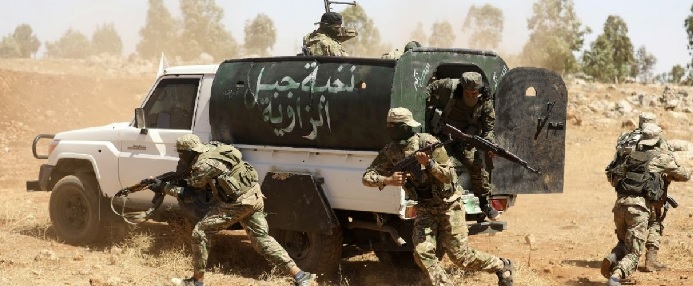
Clashes intensified on Thursday afternoon between extremist opposition groups Hayat Tahrir al-Sham (HTS), and the recently formed “Fathbito” (Be Steadfast) Operations Room, in Arab Said, just west of Idlib City—the third day of fighting between the two.
The “Be Steadfast” Operation Room, formed on June 15, is made up of five, mostly al-Qaeda-affiliated, extremist groups. The first three groups, Hurras al-Din, Jamaat Ansar al-Islam and Jabhat Ansar al-Din, were previously working together under the “Rouse the Believers” Operations Room, while the latter two, Tansiqiyat al-Jihad and al-Muqatileen, are recent offshoots from HTS.
The conflict originally started after members of “Be Steadfast” set up checkpoints just west of the city of Idlib in the town of Arab Said on June 23. Fighting quickly escalated as “Be Steadfast” took over the Idlib central prison—located in Arab Said—and HTS deployed heavy weaponry and armored vehicles to the area to recover the prison and dismantle the checkpoints.
A representative of HTS’s public relations office, Taqi al-Deen, told Syria Direct that the clashes occurred because “Hurras al-Din refused all solutions, and refused to lift checkpoints on the roads,” adding that “the era of infighting is over … and this kind of behavior is unacceptable.” He added that “all HTS is asking of them is to remove the checkpoints and hold the group with Huras al-Din in Arab Said accountable.”
For its part, a “Be Steadfast” spokesperson accused HTS of escalating the situation. “It appears from the arrest of Sheikh Abu Malik [al-Talli, the commander of al-Muqatileen al-Ansar Brigade] and others that these are escalatory steps aimed not only to arrest people but are also attempts to stop the military reforms which are aiming to prevent the fall of the [opposition] territories, as happened before,” they told Syria Direct.
As clashes raged on June 24 al-Qaeda issued a statement condemning the fighting between the groups and urging the members to ignore orders to fight one another; rather to focus on the “revolution” in Syria. Quickly after the statement, “Be Steadfast” agreed to meet with HTS to negotiate a ceasefire, though HTS declined to return the favor.
The clashes occurred after HTS faced a number of defections from its ranks, and has conducted a series of high-profile arrests, resulting in popular protest. Most recently, HTS arrested British aid worker Tauqi Sharif, Siraj al-Din Mukhtarouf (known as Abu Sala al-Uzbeki) and Abu Malik al-Talli. In response to the arrest of the latter two, both of whom are defected HTS officials, “Be Steadfast” called for their release, threatening military action otherwise.
HTS is currently facing pressure from two different directions, as its authority is threatened both by Turkey and internal fissures in Idlib province, such as that of the formation of the “Be Steadfast” Operations Room.
According to the terms of multiple agreements with Russia—chief among them the Sochi Agreement of 2018—Turkey is meant to dislodge HTS from the northwestern province. Turkey however, instead of eliminating the group outright, has preferred to promote the more “pragmatic” wing and slowly assert its own power in lieu of the extremist opposition group.
Further, HTS has to keep the more radical factions, both within its own organization and within Idlib, in check to ensure that the ceasefire between Turkey and Russia sticks. HTS also has to prevent civilians from interrupting the joint Turkey-Russian military patrols along the M4 (Aleppo-Latakia) highway, putting them in the awkward position of being an opposition faction repressing popular protest to Russia’s military presence in Syria.
The conflict between HTS’s nominally revolutionary mission and its need to toe the line with Turkey has led to doubts among the more zealous opponents of Damascus that it is really committed to fighting the Syrian regime. This is a possible reason for the recent string of defections and the formation of the “Be Steadfast” Operations Room.
“Some of the supporters of ‘[Be Steadfast]’ see HTS as essentially acting on the orders of foreign states, in particular Turkey, to enforce the international agreements over Idlib and destroy groups deemed as terrorists,” Aymenn Jawad al-Tamimi, a fellow at the D.C.-based Center for Global Policy, told Syria Direct.
At the same time that fighting was ongoing between the two groups, Syrian government forces and Russian special forces attempted to push past the ceasefire line, but were repelled by the Turkish-backed National Liberation Army (NLF), according to an NLF media outlet. In addition, a drone strike, believed to have been carried out by the US, killed a “Be Steadfast” commander on June 24.
